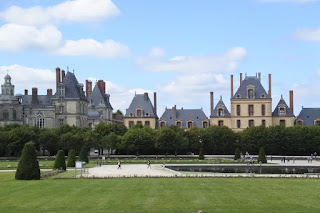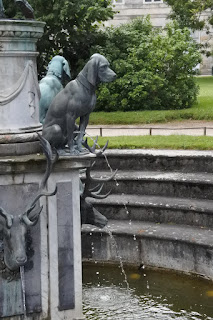In
Part 1 of Preparing for Bébé, I mentioned some of the activities we've undertaken in the final stretch of my pregnancy. And in
previous posts, I shared some of my experiences with things like health care and public transportation as a pregnant woman in France. By the way, good news on the transportation front! Once I hit about 8 months, my belly had become sufficiently large that people started regularly giving me their seat on the bus and métro. No more of the "I don't want to offend her by assuming she's pregnant if she's really not" behavior. It's been great! I really appreciate the Parisians' courtesy and generosity in this regard. The one caveat is that when people are engrossed in their phones (as most people are these days), it's much less likely they will notice my protruding tummy and I'll have to stand until a seat opens up. Such is life with technology these days.
 |
| Excusez-moi? Heavily pregnant lady would like to sit down. Anyone home? |
Anyway, in today's blog, Part 2 of Preparing for Bébé, I'll look at two of the most helpful tools I've found that have allowed us to get ready for the baby. These are specific to living as an ex-pat in Paris, but provide a good contrast to the preparation process in the US or UK.
Message: like a bridge over troubled waters
The first crucial element in our quest to be well-prepared parents has been membership in
Message, the large community of English-speaking parents and parents-to-be in Paris and its suburbs. I learned about Message from a blog post back in December when I was feverishly researching how to have a baby in France. Remember that my French language skills were pretty limited back then, so diving into French administrative websites for information on finding doctors, paying for health care, and registering at maternity hospitals was hugely overwhelming. Add on the early pregnancy hormones and anxiety, and I was barely keeping my head above water. When I found Message, I felt I had been saved.
Upon paying my 60 € membership fee, I received a very helpful book called
The ABCs of Parenting in Paris, which explained everything from declaring one's pregnancy to government agencies to what types of butter are available in Paris grocery stores. More importantly, I was personally contacted by coordinating members of Message who answered my panicked questions and suggested I explore the online Message forums, where one can find a rabbit hole of members' questions and answers on any subject regarding the ex-pat parent's experience. It was a treasure trove of knowledge. Through these forums, I found an excellent English-speaking obstetrician, learned which hospitals not to go to, and got step-by-step instructions on submitting my pregnancy declaration to the government.
In addition to the online forums, Message offers classes led by trained volunteers on topics like birth preparation, newborn care, and breastfeeding. The classes were super helpful for Rory and me, and not just because they weren't in French (though that was a big part of it!) Another nice perk is that each Message member gets an assigned Breastfeeding Support Person who will help and advise you (for free!) with any questions or problems related to breastfeeding. Furthermore, there are Message play groups, monthly meet-ups, bring-and-buy sales, and seminars, as well as support groups for single parents, adopting parents, and more.
One of the most useful features of Message for us, however, has been its online Classifieds forum. Like Craigslist or France's version,
Le Bon Coin, members can freely post their items for sale, apartments for rent, services offered, or items wanted, but you get to avoid the scams and shady characters common to Craigslist and don't have to contact people in French like on Le Bon Coin. Instead, it's just buying from one ex-pat mom or dad to another. The prices are often excellent and you can find gently used high quality (e.g. typically very expensive when new) baby gear. Plus, you get to meet friendly parents around the city who were in your shoes not too long ago and who can give helpful advice. It has been an invaluable service.
Membership in Message has already paid for itself many times over. When having a baby in a foreign country, especially when far away from family, anything that makes you feel less adrift at sea is probably worth doing.
The fact that Paris is a big enough city for a well-organized network like Message to exist, is also part of what makes living here a challenge. This city is
expensive. This brings us to the second crucial element of our baby preparation: how to save money on baby stuff in a city where an apartment the size of a closet can sell for 200,000 €.
Saving money: go used and go online
Truth #1: Living in Paris is expensive. Although many ex-pats who move here work for big global corporations and can afford to live in the shadow of the Eiffel Tower, we are not those ex-pats. Rory's two-year university contract and my very part-time music teaching keep us afloat and fairly comfortable, but the cost of living is just a smidge higher than we were used to in Ohio.
Truth #2: Having a baby is expensive. Holy catfish, Batman! Baby stuff is NOT cheap! 800 € for a stroller? 600 € for a crib? Well, there goes our month's rent...
With a first baby, there's often this desire to have brand new everything for one's precious bundle of joy. It has to be pristine! It has to be the best! I, too, had these feelings briefly.
But then I remembered that we most likely only have one year left in Paris, and international moving/shipping costs are enormous, so investing in brand new furniture and baby gear doesn't make sense as we may not even take it all with us when we move. That's where the Message Classifieds came in. The vast majority of our large baby-related purchases have come second-hand from Message members. Crib, stroller, swing, playmat, even dining room table and food processor were pre-loved by Message members. Had we bought everything new that we found on Message, it would have cost us in the neighborhood of 2100 €. Instead it cost us 595 €. It required patiently browsing through Classifieds posts every few days and making long trips out to the corners of Paris to pick items up, but the savings were definitely worth it.
Online shopping has been another huge money and time saver for us in Paris. Here's why.
As I was explaining to my incredulous mother the other day, there really aren't any big one-stop-shopping stores in our neck of the woods. Nothing like Target, Costco, or Walmart exists over here. You can find select places like Monoprix—a stand-alone department store that has groceries, clothes, and limited home goods, but the selection isn't very big by American standards and they're on the expensive side. So generally if I need to buy a wide variety of products, I have to go to a wide variety of stores. As I have no car, I have to walk or take the bus or subway to do my shopping. My 9-months-pregnant body can't handle too much of that these days, so that's strike one against traditional shopping.
Fill-your-car shopping trips and the stockpiling of groceries for the month aren't really done here either. In France, every few days you go to the
boulangerie to buy bread, the
boucherie to buy meat, the
fromagerie to buy cheese, and it lasts for a few days or a week. Refrigerators and freezers are small, apartments are small, and we haven't had a pantry or closet since we lived in the US. You don't pick up 12-packs of butter at Costco because you won't have room to store it. Besides, again, I have no car, so I can't buy more than I can carry. I even gave in last month and bought what I call a
Granny Shopping Cart, but I still can't bring that much stuff home at one time. Babies apparently need and consume a lot of random stuff, and heaven forbid if you should run out of diapers, or if the batteries for the baby swing die in the middle of the night. Or on a Sunday, when all of the stores here are closed. Going out shopping with a screaming baby every other day is probably not high on most parents' list of things to do, so that's strike two against traditional shopping.
Hence, online shopping.
After weeks of research on Amazon, bebe-au-naturel.com, lilinappy.fr, and dozens of other websites, after slowly reading and translating French product reviews and comparing prices in France, the US, and the UK, we ended up buying more than 300 € worth of baby-related stuff online (think wipes, baby laundry detergent, waterproof mattress pad, nasal aspirator, cloth diapering accessories, etc.) and had it shipped to our door (or to a nearby location for pick-up). It did mean dealing with unintelligible delivery-guy phone calls in French, but was otherwise an easy and straightforward way to ensure we got highly recommended products at cheaper prices. And I didn't have to kill my back and feet running around to dozens of stores throughout Paris to do it. I call that a win.
That's all for Part 2 of Preparing for
Bébé. In our final installment, I'll show you how we are turning our little 33 sq. m (355 sq. ft) apartment into a baby-ready home without feeling like we're on an episode of
Hoarders.
Have a splendid week, everyone!















































